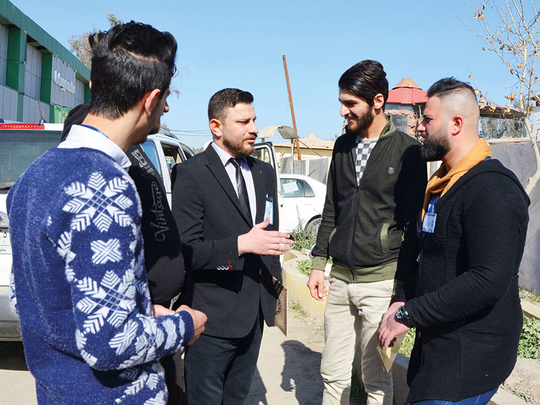
Mosul: In a classroom of the University of Mosul, in Daesh’s former capital in Iraq, around 50 volunteers have undergone a week’s training on how to combat the terrorists’ ideology.
The ulema, or Islamic scholars, aim to set up ‘brigades’ tasked with ridding Mosul residents of extremist ideas following the city’s recapture last July, which ended three years of Daesh rule.
“Mosul must be liberated from the thinking of Daesh after having been liberated militarily,” said Mussaab Mahmoud, 30, who just completed the course.
“We were deceived by Daesh ideas and now we are trying to free ourselves from its ideology,” said the day labourer.
The first group of volunteers came from all sections of Mosul society, including mechanics, teachers and a shaikh.
The men aged from 25 to 45 signed up on Facebook for the course run by the Ulema Forum of Mosul, Iraq’s second largest city, which was left devastated by the months-long battle to expel Daesh.
The classes are being conducted by five teachers who are experts in Islamic jurisprudence from Mosul and Tikrit, a city to the south that was also previously under brutal Daesh rule.
“The lessons are concentrated on human rights, human development, peaceful coexistence and communal peace,” the forum’s president Shaikh Saleh Al Obaidi told AFP.
He said participants were tutored on “faith, Islamic jurisprudence and the Hadith [record of the sayings of the Prophet Mohammad] to allow them to counter the ideas of Daesh and its intellectual terrorism”.
Priority on ‘brainwashed’ children
Daesh imposed its own rigid interpretation of Islamic law on all aspects of everyday life, branding opponents “apostates” who should be killed.
Most members of religious and ethnic minorities who had lived in peace for centuries alongside Mosul’s Sunni majority fled to escape the radicals with their beatings and public executions.
Shaikh Al Obaidi said the brigades will go out and “combat the extremist ideas on social media and by calling on residents in their homes”. His forum was established in 2014 in the autonomous region of Iraqi Kurdistan, to the north of Mosul, by ulema who had fled the city. They broadcast on private television channels but residents risked the wrath of Daesh if they were caught tuning in to the forum’s programmes.
Shaikh Al Obaidi said that the classes would expand to cover “all social groups and both sexes”, although it was still looking for permanent premises in the war-battered city.
Priority will be accorded to the children indoctrinated in Daesh-run schools where they were taught extremist ideology and given weapons training.
“As a teacher myself, what I’ve learnt here will allow me as far as possible to erase the radical Daesh ideas instilled in pupils, because they were the worst affected and influenced,” said Ebrahim Mohammad Hamid, 27.
“I will go to the parents because the home and the family play a major role in spreading the idea of tolerance and coexistence,” he said.
Mohammad Abaiji, a 24-year-old imam, or prayer leader, said he would run seminars in the mosque for children “to spread enlightened ideas, because Islam is a religion of tolerance”.










